
views
The Madhya Pradesh High Court’s Gwalior bench recently held that a teacher’s act of scolding and reprimanding a student would only be an attempt at course correction and would not constitute an offence.
The bench of Justice Anand Pathak allowed a petition under Section 482 CrPC filed by the principal, vice-principal, and a teacher at Vivekanand Higher Secondary School, Tekanpur, Dabra in Gwalior. The court quashed the FIR and all other consequential proceedings instituted against them for the offences under Sections 306 (abetment to suicide), and 34 of IPC.
A class 12 student of the school had ended his life after being admonished and allegedly insulted by the school authorities.
The allegations were that the student, along with two others, had been caught bursting crackers in the school toilet, for which he had been scolded by the principal. The vice-principal subsequently summoned the student’s parents to the school the following day. This incident allegedly imposed psychological stress on the student, who went to his house and took his own life by hanging himself.
Seeking relief before the high court, the counsel for the petitioners argued that the principal’s scolding was aimed at safeguarding the interests of other students, as the deceased student’s misbehaviour had resulted in damage to the school bathroom wall.
There was no intentional bias against the deceased, and no physical abuse occurred; instead, it was only verbal reprimand, he contended.
While acknowledging the distressing nature of the incident for the family, the court emphasised the need to assess the responsibility of the teachers involved.
The HC pointed out that despite the current prohibition of corporal punishment under Section 2(24) in conjunction with Section 82 of the Juvenile Justice (Care and Protection of Children) Act, 2015, alternative methods of social control have been devised to address behavioural issues among school-going children.
“Children are required to be tutored not only to be good in academics but they ought to be tutored to become a good citizen so that they may add to the assets of the society rather than becoming liability. If corporal punishment is banned and if child out of his curiosity or ignorance or peer pressure (which is very high in school days) commits any deviant behaviour or unaccepted way of pupilship, then he is required to be corrected by measured reprimand or scolding,” opined the single-judge bench.
The court emphasised that it is the prime duty of the principal and other teachers to maintain discipline and a peaceful atmosphere in the school premises so that other children may not suffer adversely and grow holistically.
Taking into account the facts of the case, the HC held that in the present case, it was obvious that the whole course of events unfolded in a manner as a course correction rather than any abetment and instigation.
The court held that in the present case, none of the three crucial conditions required for prosecuting a person under Section 306 of the Indian Penal Code were present: a. instigation to commit suicide, b. conspiracy leading to the person committing suicide, and c. intentionally aiding by an act or omission to commit suicide.
“Their role is confined to causing reprimand or scolding the boy for his act which was the duty of the Principal and other Teachers…They never had any intention in respect of the deceased boy that he should commit suicide,” the court underscored while stating that “parents hand over the children to the school with the trust that school will take care their wards as their parents and therefore, such reposition of trust cannot go in vain with timidity and fear of backlash. Teachers should be placed over and above such fear, else they will be failing in their duties in formulating the future of mankind.”















Comments
0 comment